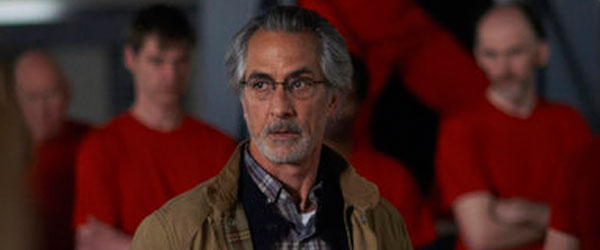Mr. Harvey: ALPHAS Sets Up More Disaster… But It's a Good Thing
[photos: Russ Martin/Syfy]
When we last left our intrepid heroes, Dr. Rosen had just revealed the existence of the Alphas to the world, and basically changed the nature of the secret war that Über-Alpha Stanton Parrish had been waging behind the false front of Red Flag. Unfortunately, this wasn’t at all what his government minders wanted him to do, and now, with Rosen in prison and the Alphas team scattered, only a crisis the DOD can’t handle can bring them back together…
HERE BE SPOILERS.
If you haven’t read my review of the first season finale of ALPHAS, then, well, you should. Here it is. In it, you’ll find that I was really impressed with the events of “Original Sin”, and looking back oh these many months later, I still am. The resolution of the Red Flag arc; the revelation of the true villain of the show, Stanton Parrish; the layers added to David Strathairn’s Dr. Rosen, and of course, the final minutes, where Rosen exposes the Alpha Phenomenon to the world, going against his DOD minders in an attempt to take away the secrecy that Parrish needs. It was a game changer, and frankly, not at all expected.
But that was then… what does the new season bring?
Eight months later, the government has imprisoned Rosen in a high security mental institution, spreading the word that he is unstable, effectively reducing his revelations about Alphas to the ravings of an imbalanced mind. Understandably, he’s not cooperating all that much the psychiatric staff, insisting that what they call delusions of persecution are, in fact, far from delusions.
Outside in the world, his team of Alphas is scattered, with only Hicks (Warren Christie) and Bill (Malik Yoba) still operating with the DOD, using their abilities to police the growing threat of Alpha crime. Rachel (Azita Ghanizada) has retreated back home to her family, overwhelmed by her hyper-senses without Rosen’s support, and Nina (Laura Mennell) has returned to her old manipulative ways, using her ability to “push” others to get what she wants. And Gary (Ryan Cartwright), the young autistic man whose ability to read and manipulate wireless information makes him incredibly valuable to the intelligence community, has been assigned to the NSA.
When Bill and Hicks capture an Alpha during a robbery and take her to Binghamton, the secret government facility for Alphas, they discover that Gary has become an inmate there, having attacked his NSA minders. It seems they ignored the specific needs of his condition, and when he reacted, they sent him to the prison and, like every Alpha there, implanted a chip in his brain that renders him all but catatonic. While Bill and Hicks try to get him released, the prisoner they brought to Binghamton is revealed as a Trojan horse… when the doctors try to insert the implant she sets off a pulse that disables all the implants, releasing the Alphas imprisoned from their mental restraints. Suddenly some of the most dangerous people in the world, people with abilities that make them extremely deadly, have control of the prison, and Gary and Bill are their hostages.
The only man they will talk to? The man who put them all there… Dr. Lee Rosen.
…………
Ok, lets just get this out of the way. “Wake Up Call” isn’t actually a soft reboot, but it started off looking a lot like one. By having Rosen be discredited, the writers have, to some degree, erased the very public reveal of the Alphas, with only the conspiracy minded still talking about it. With the team broken up, the romantic relationship between Hicks and Nina has collapsed, and her work towards redeeming herself has taken many steps back. And the resolution of the episode, where Rosen has his team back, and many of the Alphas imprisoned at Binghamton loose again in the world, looks a lot like Season 1. To be honest, the first time I watched this episode, it felt like the reset button had been hit, and all the quite interesting possibilities of what looked like a war between the worldviews of Parrish and Rosen becoming a very public thing seemed lost.
The first time I watched it.
Here’s one of the negative side-effects of reviewing genre fiction: I am critical as hell. I read a LOT, I watch a LOT of genre TV and film, and as you, dear reader, know, there’s a percentage of it that is really, really bad. Reset buttons are hit all the time, characters do stupid things to advance the plot, and some of the most popular stuff out there is really, really badly written.
I was quite happy to see that overall, ALPHAS has been pretty good about not being that kind of show, especially since it airs on the Syfy Channel which, aside from some rare exceptions like WAREHOUSE 13, EUREKA, and, yes, in my opinion at least, STARGATE UNIVERSE, doesn’t have much of a good track record these days for that sort of thing. ALPHAS took the idea of the X-MEN and grounded it a little more in reality, explored the decisions, good and bad, of those in government who found themselves dealing with a new breed of humanity, and gave us characters who actually grew across the first season. And because I did like the first season so much, although it had its flaws, I admit to coming into the second season opener with some pretty high expectations. And like I said, the first time I watched it…
But as I have been writing this review, I’ve watched it several times, and here’s me hoping that you watched it with less of a critic’s eye than I, because that first viewing? A little unfair.
Because there really isn’t a reboot or reset here, at least not as much as I first thought. Sure the team is back together, sure there’s some relationship changes, sure some of the characters have lost some ground, but actually, that’s OK. There are some fairly big changes here, and what this show does with them next… well.
First we have the imprisonment of Rosen, and his being discredited. Sure, by the end he’s been pardoned, and his reputation restored, but how much of that is going to stick? They establish in this episode that there are Alpha conspiracy websites, and Nina silences a man ranting on the street, warning of the Alphas among us. If they continue to play with that sort of thing, Rosen is likely to run into those who either think the accusations against him matter more than his pardon, and/or those who think he’s part of the coverup the government put into place. Both of those are true as it happens…
Second, Rosen is now in charge. Finally, after fighting with the DOD for years over how the Alphas have been handled, he’s in the position he’s wanted to be in from the beginning. He runs the Alpha team, not the DOD, and he decides what happens to the rogue Alphas they capture. This, of course, could blow up in his face, because now he has the chance to deal with them the way he thinks is best, and therein lies the possibility of failure. And we’ve seen that Rosen is far from perfect, and when he fails, he doesn’t fail small…
Thirdly, the war is still coming. Stanton Parrish is still out there, Rosen’s daughter is still with him, and with the false-front Red Flag “destroyed”, Parrish seems to have decided to move his timetable up. His “concern” for Rosen’s well-being is… interesting, and now, well, now he has the beginnings of an army. An army that has been prisoners of the DOD, and a lot less likely to have the ethical qualms of Anna’s version of Red Flag. Things could get real messy, real quick.
So yeah, I’m actually pretty happy with the first episode of season two, because if they run with some of these things, and based on season one, they do have a tendency to, there’s a LOT to play with here. Of course, time will tell, and it could all go wrong. But for now, I’m ready to give them the benefit of the doubt.
>>>
[Official Show Site at Syfy] [Previous recap: “Original Sin”]








